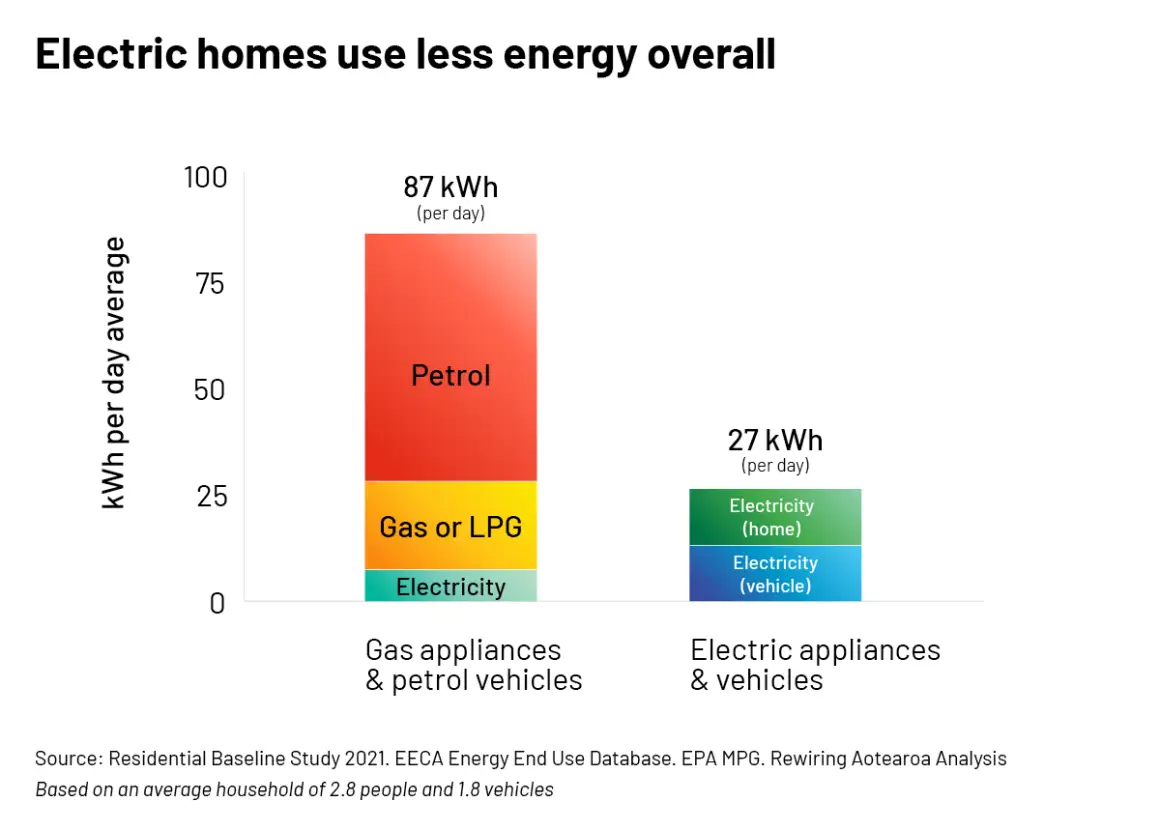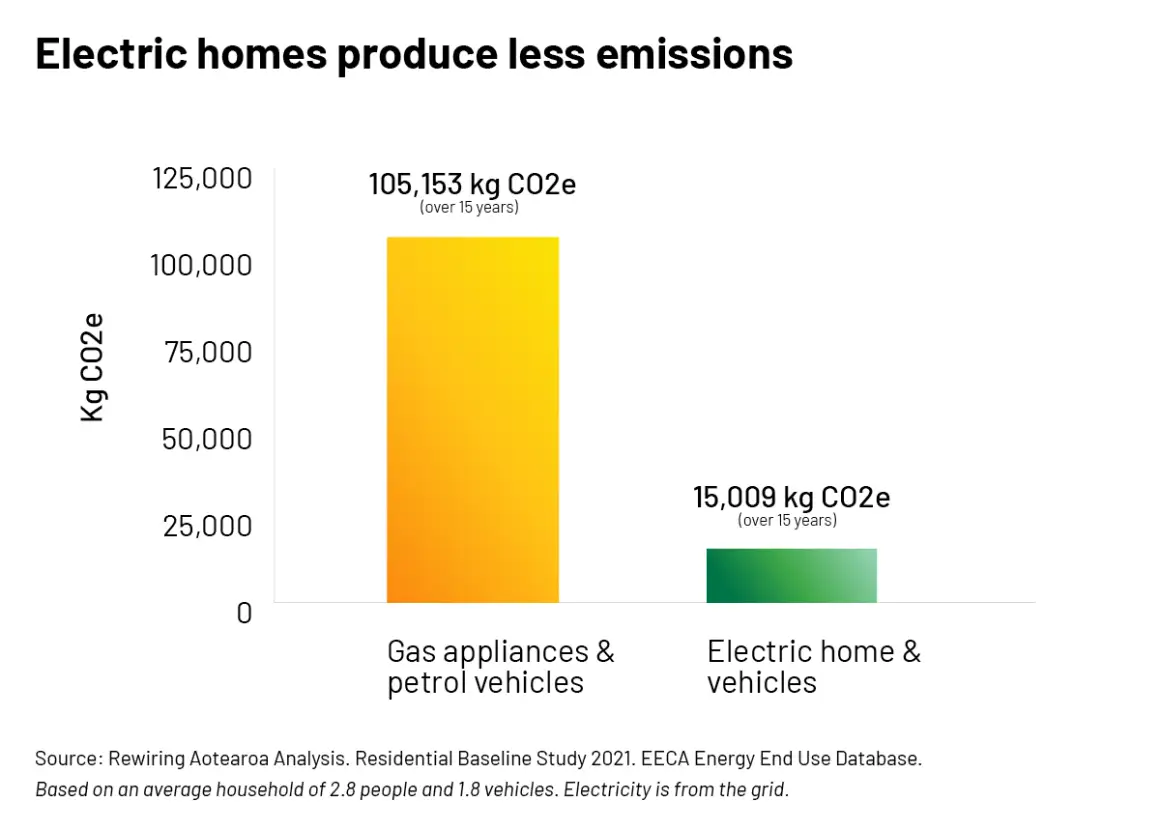The electric revolution
New research has highlighted the cost and emissions saving benefits of powering our homes with electricity.
But how ready and willing are New Zealand homeowners to make the switch?
Our homes are more than just buildings – they are the sanctuaries where we build our lives, nurture our health, and cultivate our relationships. They represent our safety, comfort, and well-being. As such, ensuring they are equipped to meet our present and future needs is important. This includes making thoughtful decisions about the systems that keep them running smoothly.
By planning ahead and investing in efficient and sustainable systems, we can ensure our homes remain comfortable and resilient for years to come.
For example, if our hot water system fails, it’s not just an inconvenience – it’s a critical moment to consider the broader implications of our choices. While the quickest and cheapest solution might be to replace it with a similar model, this decision locks in the energy costs and environmental impact for the lifetime of that appliance – potentially the next 15 years.
On the other hand, upgrading to an energy-efficient electric hot water heat pump can improve a home's sustainability and operating costs in the long run, even if more upfront capital is required to make that initial purchase.
According to a recent survey by EECA (the agency that backs Gen Less), over a third of household heating and hot water systems in New Zealand are over 10 years old, indicating a substantial number of homes are due for an upgrade. This presents a crucial opportunity for homeowners to adopt more sustainable and energy-efficient technologies, making our homes not only more environmentally friendly but also more economical to run.
However, the survey also highlighted a gap in knowledge among New Zealanders about these advanced technologies. Many are unaware of the benefits of newer, energy-efficient systems and do not necessarily associate electricity with cleaner energy.
One-third of homeowners don’t identify electricity as the cleanest energy source out of electricity, gas, coal and oil.
One-third of homeowners don’t identify electricity as the cleanest energy source out of electricity, gas, coal and oil.
Electrifying Aotearoa: The consumer perspective. EECA and TRA report, April 2024
Greener energy
In New Zealand, we are lucky to have an electricity grid that is largely powered by clean, renewable sources such as hydro, geothermal and wind energy. In a typical year, 80-85% of our electricity is generated from renewable sources.
However, most of us underestimate our country’s renewable electricity supply. Three quarters of homeowners surveyed either estimated that 70% or less of our electricity generation was renewable, or didn’t know. And one third did not correctly identify electricity as the cleanest energy source when compared to fossil fuels like gas, coal and oil/petrol/diesel.
Around two in five New Zealand owner-occupier households use either piped gas or bottled LPG for hot water or cooking, and 5% use gas for heating. But homeowners now have more choice than ever with new electric technologies on the market – and every new appliance purchase is an opportunity to make a positive change to cleaner energy.
An all-electric household produces 85% less greenhouse gas emissions than a mixed-fuel household, with the largest impact coming from electric vehicles.
Electric Homes Technical Report, Rewiring Aotearoa, March 2024.
More affordable living
While the number one consideration when choosing an appliance replacement is the upfront cost of purchase, EECA’s research showed that ongoing running costs are also high on the minds of New Zealanders. And it pays to do the math.
Modelling shows that households that have all-electric appliances can save around $1,000 per year in energy costs compared to households that use a mix of electricity and gas.
When purchase price and installation costs are factored in, the all-electric household is around $10,000-$20,000 cheaper over 15 years.*
Generally, the newer electric technologies are more expensive up-front than gas or traditional electric options, but they’re also more energy-efficient, which leads to lower running costs and can offset the higher purchase price over time.
For homeowners thinking about switching to electricity, it can make sense to either switch all appliances over to electricity at once, or have a clear plan in place for transitioning appliances in stages. This is because one of the major energy costs associated with gas is the ongoing fixed cost of the connection charge or bottle rental. Cutting this cost completely can increase savings significantly over time.
While it's likely that energy costs will rise over time, electricity will remain cheaper than fossil fuels, and the savings from going electric are significant enough to outweigh an increase.
Choosing electric appliances can save you money in the long run
Better performance
One thing potentially holding back the adoption of new electric technologies, like hot water heat pumps, in New Zealand homes is their newness, and therefore low awareness of their advantages.
In fact, over a third of the people EECA surveyed had never heard of hot water heat pumps at all, and another third knew nothing about them other than the name.
When it comes to ‘living room’ heat pumps, EECA’s research found that while New Zealanders are very familiar with them, they aren't necessarily thought of as efficient. Among those that didn't have a heat pump, only around one-third were aware of the lower running cost/energy efficiency advantage.
For cooktops, performance is a more important factor to Kiwis than energy efficiency – which is fair enough, as the energy usage (and therefore cost) of stovetop cooking is relatively low. Gas cooktops are valued for providing instant heat and temperature control. Electric induction cooktops have these same advantages (and in fact can heat faster than gas), but only 29% of gas cooktop owners surveyed considered faster cooking an advantage of induction, and only 12% considered induction to offer better cooking than gas.
These results have highlighted that raising awareness about the benefits and efficiency of these clean electric technologies is crucial to encouraging their adoption and paving the way for a more sustainable future in New Zealand homes.
The efficiency of new electric technologies leads to significant energy savings
A fully electrified home, where all appliances and vehicles run on electricity, uses more than double the electricity of a mixed-fuel home. However, overall energy use is drastically lower – and the cheapest energy is the energy we don't use.


As we look to the future, electrifying our homes offers significant cost and environmental benefits. However, this transition doesn't have to happen overnight. Each homeowner's journey will be unique, and gradual changes can lead to substantial improvements.
With the right information and a proactive approach, New Zealand homeowners can lead the way in the electric revolution, ensuring our homes are not only more affordable but also contribute to a healthier planet.
Read next
-
Switch on efficiency
See how much you could save on running costs by choosing energy-efficient appliances.
-
Green loans for your home
Discounted finance options as low as 0% are available to help you transition your home or car to be more energy efficient.
-
Is your power plan right for you?
Power bills take up a big chunk of household expenses, but switching to a better plan could save you money.
